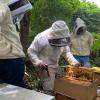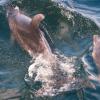Establishment Of Marine Protected Areas Alone Does Not Restore Coral Reef Communities In Belize
A variety of factors have caused the loss of corals and fishes on coral reefs, resulting in ecological, social, and economic consequences for reef ecosystems and the people who depend on them. A widely employed management action to restore reef communities is the implementation of marine protected areas (MPAs). We measured the effectiveness of the MPA network in Belize in promoting increases in fish and coral populations and identified key ecological and environmental factors that influence reef community structure and potentially protection success. From 2009 to 2013, we annually surveyed 16 reefs in Belize, including 8 MPA sites (where extractive fishing is limited or prohibited) and 8 unprotected sites. At each site, we quantified the biomass of reef fishes, coral and macroalgal cover, and several biotic and abiotic variables that are known to affect reef inhabitants. High predatory reef fish and parrotfish biomass values were associated with high reef structural complexity and low wave exposure. Mean macroalgal cover was negatively associated with parrotfish biomass in 1 protected zone. However, mean macroalgal cover remained above 40% across all sites, and no change in coral cover was observed during the study. Our results indicate that fisheries restrictions alone do not lead to increases in coral cover even when successful for fishes. We speculate that both illegal and legal fishing may be compromising Belize’s MPA network goals. Furthermore, we suggest that species composition as well as local environmental conditions play key roles in coral reef recovery and should be considered when evaluating management strategies.
Area of Interest: Belize
Year: 2017




